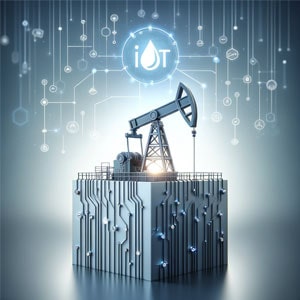Articles
The Internet of things in the Oil, Gas, and Petrochemical Industry

The Internet of things in the Oil, Gas, and Petrochemical Industry
In recent decades, the oil, gas, and petrochemical industry has been recognized as one of the largest and most critical sectors on a global scale. Due to its heavy reliance on complex technologies and precise processes, this industry is constantly seeking ways to optimize operations, reduce costs, and enhance safety. One of the advanced technologies that has gained significant attention in this sector is the Internet of Things (IoT). IoT refers to the connection of devices and machinery to the internet and their interaction with each other to improve processes. Through the collection and analysis of vast amounts of data, this technology enables greater efficiency and risk reduction. In this article, we will explore the role of the Internet of Things in the oil, gas, and petrochemical industry, highlighting its applications in improving performance, safety, resource management, and cost reduction.
What is the Internet of Things (IoT)?
The Internet of Things (IoT) refers to a network of devices, sensors, machinery, and smart systems that are interconnected via the internet, enabling them to collect, transmit, and exchange data. This data can be gathered and analyzed in real-time or at specified intervals. IoT has wide applications across various industries, including transportation, agriculture, healthcare, and especially in the oil, gas, and petrochemical sectors. The Importance of IoT in the Oil, Gas, and Petrochemical Industry
The oil, gas, and petrochemical industry relies heavily on large and complex equipment, with significant economic and environmental impacts. This sector faces numerous challenges, such as resource management, production optimization, safety and environmental risk reduction, and cost minimization. IoT offers an innovative solution to these challenges by enhancing performance, increasing efficiency, and reducing risks. Since this technology can collect real-time data from equipment and infrastructure, it enables operators to make better and more accurate decisions in real-time.
Applications of the Internet of Things in the Oil and Gas Industry
1. Smart Monitoring and Resource Management One of the primary applications of IoT in the oil and gas industry is monitoring equipment and operational processes. Smart sensors can provide precise data on temperature, pressure, flow, and fluid levels in oil wells, pipelines, and refineries. This data allows managers to optimize processes and prevent leaks or technical issues.
2. Predictive Maintenance Using data collected via IoT, equipment performance patterns can be analyzed to predict when maintenance is required. Predictive maintenance helps reduce unexpected breakdowns and extends the lifespan of machinery. For instance, in a refinery, smart sensors can continuously monitor the performance of pumps, turbines, and other equipment, issuing alerts when anomalies are detected.
3. Safety and Incident Prevention Safety is one of the biggest challenges in the oil and gas industry. IoT enhances worker safety and reduces accidents by providing accurate real-time data from operational environments. For example, gas sensors can detect hazardous gas leaks and issue immediate warnings. Additionally, smart cameras and motion detection systems can identify suspicious or dangerous activities in sensitive areas.
4. Energy Optimization Another advantage of IoT in the oil and gas industry is energy optimization. By analyzing data collected from sensors, companies can adjust production processes to minimize energy consumption. This is particularly important in energy-intensive facilities like refineries.
5. Supply Chain Management IoT can improve supply chain management in the oil and gas industry. Internet-connected sensors provide real-time information about the transportation, storage, and distribution of raw materials and finished products. This enables more precise control and management of logistical processes.
Examples of IoT Applications in the Oil and Gas Industry
1. Shell Company
Shell utilizes IoT technology to optimize operations at drilling sites and refineries. Through internet-connected sensors, the company collects and analyzes data related to drilling and production equipment. This information enables operators to enhance production processes and reduce safety risks. ***** 2. British Petroleum Company (BP) BP employs IoT to monitor and manage its infrastructure in oil fields. IoT sensors installed in these fields collect data on environmental conditions and equipment performance. This data helps BP predict failures, reduce maintenance costs, and prevent accidents.
3. Saudi Aramco Company
Saudi Aramco, the world’s largest oil producer based in Saudi Arabia, is engaged in the exploration, production, refining, and distribution of crude oil. Aramco leverages IoT technology to monitor environmental conditions and ensure the safety of its operations. IoT aids in detecting gas leaks and other environmental hazards. *****
Additionally, Aramco uses IoT systems for tracking and managing inventory in the supply chain, contributing to supply optimization and cost reduction. With IoT, the company collects and analyzes vast amounts of data to make more informed decisions regarding production and efficiency.
Applications of IoT in the Petrochemical Industry
1. Process Automation In the petrochemical industry, IoT can automate complex production processes. Interconnected sensors and controllers monitor key parameters such as temperature, pressure, and reaction speed. In case of any abnormal changes, they can take corrective actions to improve conditions.
2. Equipment Health Monitoring Like the oil and gas sector, the petrochemical industry can use IoT for precise and continuous equipment monitoring. This reduces downtime and increases equipment efficiency.
3. Safety Improvements Given the potential risks in chemical processes, IoT plays a critical role in enhancing safety. For example, temperature and pressure sensors can help prevent unauthorized reactions or potential explosions.
4. Cost Reduction A key goal in the petrochemical industry is to reduce costs while increasing efficiency. By optimizing processes and preventing equipment failures, IoT helps petrochemical companies lower their operational expenses.
Benefits of IoT in Oil, Gas, and Petrochemical Industries
1. Increased Efficiency IoT provides accurate, real-time data on equipment performance and processes, enabling managers to make better decisions and optimize operations. This leads to increased production and reduced resource wastage.
2. Cost Reduction One of the most significant advantages of IoT in these industries is operational cost reduction. Continuous monitoring and predictive maintenance minimize expenses caused by unexpected downtime and major repairs.
3. Enhanced Safety and Risk Mitigation Given the high-risk nature of these industries, IoT significantly improves safety. Smart sensors can detect hazardous conditions and send early warnings, preventing serious incidents.
4. Improved Decision-Making Data collected via IoT helps companies make data-driven decisions, leading to better management and operational strategies.
Challenges of Using IoT in the Oil and Gas Industry
1. Cybersecurity As IoT devices are connected to internet networks, cybersecurity threats become a major challenge. Cyberattacks can disrupt system operations and cause financial and even human losses.
2. Implementation Costs While IoT can reduce costs in the long term, its large-scale implementation can be expensive. Companies need to make significant investments in infrastructure and employee training.
3. System Complexity Integrating IoT systems with existing infrastructure can be challenging. Coordinating data and systems from different sources and ensuring compatibility among various devices require careful planning and management.
4. Need for Skilled Workforce The implementation and maintenance of IoT systems demand skilled professionals in IT, cybersecurity, and data analysis. A shortage of such expertise can be a major barrier to widespread adoption of this technology.
The Future of IoT in the Oil, Gas, and Petrochemical Industries
With rapid technological advancements, the use of IoT in these industries is expected to grow significantly. By providing smart solutions and automating processes, IoT will enhance efficiency and safety in operations.
Additionally, as data generation continues to grow, technologies like artificial intelligence (AI) and machine learning (ML) will play an important role alongside IoT in shaping the future of these industries. IoT is emerging as a key technology driving transformation in the oil, gas, and petrochemical sectors. By improving monitoring, increasing efficiency, reducing costs, and enhancing safety, IoT creates new opportunities for these industries. However, challenges such as cybersecurity, implementation costs, and system complexity still need to be addressed. In the future, with further development of IoT and its integration with other advanced technologies, these industries are set to experience significant transformation.
